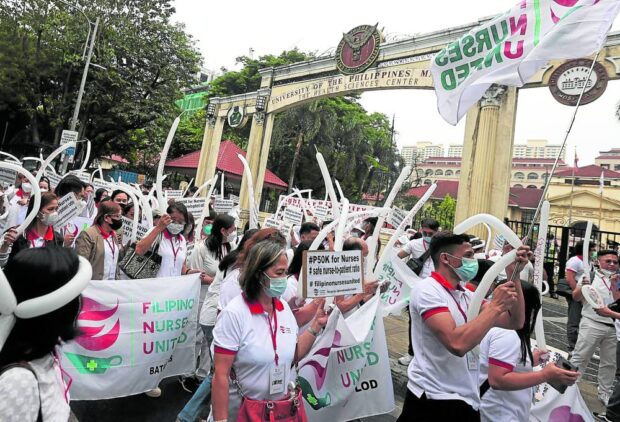
UNDERPAID | Members of Filipino Nurses United stage a protest rally at the UP-PGH in Manila to call for a P50,000 entry-level salary for nurses. (Photo by MARIANNE BERMUDEZ / Philippine Daily Inquirer)
MANILA, Philippines — House Deputy Minority Leader Bernadette Herrera on Monday proposed the creation of a new wage category for healthcare workers and professionals to adequately address the pay concerns of those working in private medical facilities.
In a statement, the Bagong Henerasyon (BH) party list representative acknowledged as valid the wage concerns raised by nurses and other health professionals working in private hospitals and clinics, particularly the wide gap between the compensation they receive and that of their public counterparts.
Herrera said the concern must be addressed because “the disparity in wages between the private and public health sectors is a glaring and continuing injustice.”
She proposed for further study by Congress, the Department of Budget and Management, and the Department of Finance the creation of a new wage category for healthcare workers.
According to Herrera, current minimum wage laws and regulations allow the classification of workers into agricultural, nonagricultural, administrative and clerical, industrial zone, and household.
“I therefore suggest a new wage category for healthcare workers, including health professionals,” she said, pointing out that workers in the new category should have a national minimum wage rate that should be at least 50 percent higher than the highest rate in Metro Manila.
‘At least P1,000 a day’
Herrera said, “If it were entirely up to me, the daily minimum wage of an entry-level healthcare worker in the private sector should be at least P1,000 a day or P22,000 per month for at least 22 days of work in a month.”
“Given current economic conditions and the essential and crucial role of health-care workers, P1,000 a day is a just minimum wage at entry level. The wage rates of those at higher than entry-level, should of course be higher,” she added.
Herrera said that to address affordability concerns of private medical facilities on the minimum wage daily rates, the national and local governments could offer a direct subsidy—P400 from the national government and P100 from the localities—to the daily minimum wage for 22 work days.
Herrera said that another form of subsidy for private hospitals and clinics could be service contracting similar to the Department of Transportation’s Edsa bus carousel program as well as the Department of Education’s entrusting students who cannot be accommodated in congested public schools to private schools.